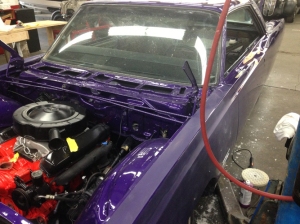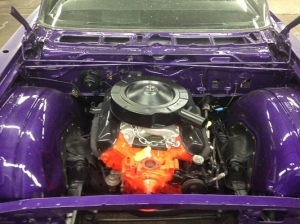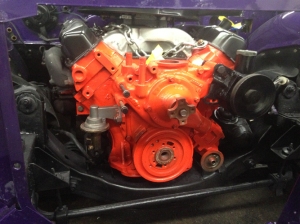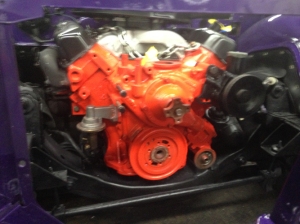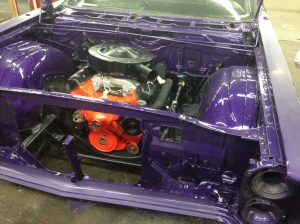1968 Plymouth Fury III
The 1968 Plymouth Fury III is a model automobile produced by the Plymouth division of the Chrysler Corp. from 1956 to 1978. It was introduced as a sporty, premium-priced model designed to showcase the line, with the intent to draw consumers into showrooms. The word “fury” denotes a type of anger, inspired by the Furies, mythological creatures in Ancient Greek and Roman mythology.
In 1965, Chrysler full-size cars made a comeback and the full-size Plymouth line included three special Furys: the Fury I, Fury II, and Fury III. The Fury I was marketed to police and taxi fleets, or sold to private customers wanting a basic, no-frills full-sized car, while the Fury II and Fury III were progressive upgrades from the Fury I in trim, specifications, and equipment. Many [vague] Sport Fury models (as well as Fury III models) came loaded with options such as automatic transmission, power steering, white sidewall tires (along with full wheel covers), stereo radios, vinyl tops, and air conditioning.
The overall design changed, with the grille losing chrome but gaining two vertical stacked headlights on each side. All new Fury’s got a new 119 in (3,000 mm) wheelbase (121 in (3,100 mm) for the wagons) — 1 in (25 mm) longer than before. The 426 “Street Wedge” V8 was introduced, rated at 385 hp (287 kW) but finally street-legal.
From 1966 to 1969, a luxury version of the Fury, called the Plymouth VIP (marketed as the Very Important Plymouth in 1966) was fielded, in response to the Ford LTD, Chevrolet Caprice, and the Ambassador DPL… These models came with standards such as full wheel covers, vinyl tops, luxuriously upholstered interiors with walnut dashboard and door-panel trim, a thicker grade of carpeting, more sound insulation, and full courtesy lighting. In addition to options ordered for the Fury III and Sport Fury models, VIPs were often ordered with such items as automatic transmission, conditioning, power, and power seats.
The full size Dodge Phoenix was based on the Dodge Polara until 1965, when that car became a right-hand drive version of the contemporary Fury. Phoenixes continued production until 1973, each based on that year’s North American Plymouth Fury.
The 1968 Plymouth Fury III in current inventory has white exterior with black vinyl interior. The general condition is excellent as it has been professionally re-built based on the original 318 Poly engine with 727 automatic transmission. The engine and its compartment are clean while all hoses are new. The exterior is in excellent condition, and has been professionally re-painted — no rust, no dents. The interior is also original and in perfect.
This is also in very good condition and the dashboard as good as new, with all all gauges operational and intact, its speedometer re-built. The upholstery has a tear in the front driver’s seat but the door panels are in fair condition. The trunk is in excellent condition –no rust, new plugs.
Up front, the fine mesh grille was replaced by horizontal bars set within frames that gave a split grille effect. At the back, the taillights were moved to the upper edge of the trunk, set within stamped panels that somewhat imitated the new split grille. On the Sport Fury and Fury III, the remainder of the panel was filled with brushed aluminum material; lower cars just had a painted stamped panel there. The upper edge of the bumper featured widely spaced “P-L-Y-M-O-U-T-H” letters. These changes resulted in a .4-inch increase in length and a .7-inch increase in width to 209.8 and 78.7 inches.
Inside, the bottom edge of the speedometer was given a curve, and a new console in the bucket seat Sport Fury replaced the one introduced in 1964. The console sprouted a new automatic transmission lever with a reverse lockout button on the top. The desire for a reverse lockout on the four-speed manual cars led to the mighty Hurst shifter being replaced by a willowy Inland unit, a step backwards in the opinion of the classic car enthusiasts.
For more details: Please visit Classic Car Addiction site.


